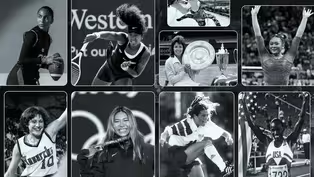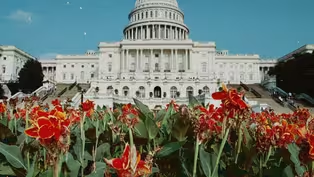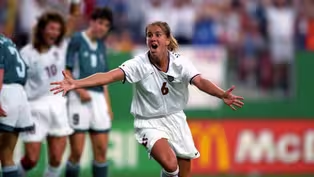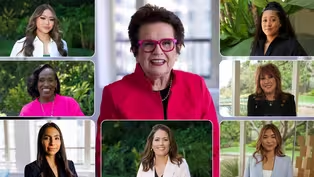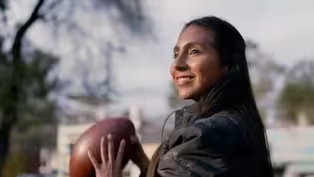
Julie Foudy on the 1999 Women’s World Cup
Clip: Season 1 | 3m 14sVideo has Closed Captions
Julie Foudy shares the story of the 1999 Women’s World Cup with Suni Lee.
Julie Foudy recounts the story of the 1999 Women’s World Cup to Suni Lee. At the time, women’s soccer was a fledgling enterprise – the players were making just $10 a day as a per diem. But the tournament drew huge crowds and record TV ratings, which was just the leverage the team had been waiting for.
Problems playing video? | Closed Captioning Feedback
Problems playing video? | Closed Captioning Feedback
CORRECTION (Dec. 8, 2023): This program mistakenly refers to two events of the women’s heptathlon as the 60-meter and 1,000-meter run. The program should have referred instead to the 200-meter...

Julie Foudy on the 1999 Women’s World Cup
Clip: Season 1 | 3m 14sVideo has Closed Captions
Julie Foudy recounts the story of the 1999 Women’s World Cup to Suni Lee. At the time, women’s soccer was a fledgling enterprise – the players were making just $10 a day as a per diem. But the tournament drew huge crowds and record TV ratings, which was just the leverage the team had been waiting for.
Problems playing video? | Closed Captioning Feedback
How to Watch Groundbreakers
Groundbreakers is available to stream on pbs.org and the free PBS App, available on iPhone, Apple TV, Android TV, Android smartphones, Amazon Fire TV, Amazon Fire Tablet, Roku, Samsung Smart TV, and Vizio.
Buy Now
Providing Support for PBS.org
Learn Moreabout PBS online sponsorship- We were trying to establish the team in the '90s as kind of the first group coming through, and we started having more success, we won that first World Cup, we won the Olympics.
You know, we're gonna be hosting the first World Cup in the United States.
What we quickly realized is nothing was changing in terms of the support for us.
Like, we were literally still making $10 a day.
That was our per diem.
- Oh, my... - $10 a day.
- $10 a day?
- Yes, with really no external income outside of that.
You know, we kept nudging like, hey, yo, we can't survive on this.
We're no longer in college, like, we need to either go work, which means stop playing, or you need to start paying us more.
So we're getting more frustrated and more frustrated each year.
- [Billie] The United States hosted its first Women's World Cup in 1999.
It was the summer that changed everything for soccer in America.
The three-week-long tournament packed stadiums with newly passionate soccer fans and captivated the nation with record television ratings.
(soft music) - [Julie] I think the thing that made '99 so remarkable is that no one expected packed stadiums, 40 million people watching on TV.
They just didn't expect that.
Because everyone said, Do it in small stadiums... - Mm-hmm.
- Make sure-- maybe you just want to do it on the East Coast, you know, make it regional.
But it was a World Cup, and a World Cup is like an Olympics.
It's like, no... - Yeah.
- Why would we go small?
Let's go big.
Let's do big stadiums, national footprint.
And everyone thought we were crazy, and we ended up crushing it.
(upbeat music) The final of the 1999 Women's World Cup ends in penalties, of course.
Brandi Chastain, she's the fifth kicker.
If she makes it, the United States wins.
And she doesn't just make it -- make it -- she side-nets it.
Beautiful kick... (crowd cheering) And then, she rips off her jersey.
Flexes, sports bra, front page of every magazine across the nation.
You may remember the iconic photo.
And we won the World Cup at home in front of a lot of people watching on TV and a packed Rose Bowl stadium, and it was really cool.
And that's when soccer just... - That's insane.
- It was really the first time that people go, "Oh, this is the potential for women's sports."
There was that glimpse in '99 where we were like, oh, my gosh, this is the potential... - It had the potential, yeah.
- This is what it should be.
- [Billie] The team won that World Cup in epic fashion.
The iconic photo of Brandi Chastain did spark some controversy.
Although men have been ripping off their shirts in celebration of wins for decades, some were in an uproar over Chastain's actions, revealing that double standards for men and women were alive and well.
But despite that criticism, the World Cup win was definitive proof that women's soccer was a successful commercial enterprise.
It was the leverage this team had been waiting for.
Video has Closed Captions
Preview: S1 | 31s | Billie Jean King and seven icons discuss the past, present and future of women’s sports. (31s)
Video has Closed Captions
Clip: S1 | 4m 1s | Learn about the legislative history of Title IX. (4m 1s)
Naomi Osaka on Her 2018 U.S. Open Win
Video has Closed Captions
Clip: S1 | 4m 9s | Naomi Osaka talks to Jackie Joyner-Kersee about win 2018 U.S. Open win and mental health. (4m 9s)
Nancy Lieberman and Chloe Kim on Being Role Models
Video has Closed Captions
Clip: S1 | 1m 22s | Nancy Lieberman and Chloe Kim talk about being role models for the next generation. (1m 22s)
Julie Foudy on the 1999 Women’s World Cup
Video has Closed Captions
Clip: S1 | 3m 14s | Julie Foudy shares the story of the 1999 Women’s World Cup with Suni Lee. (3m 14s)
Video has Closed Captions
Preview: S1 | 2m 13s | Billie Jean King and seven icons discuss the past, present and future of women’s sports. (2m 13s)
Diana Flores on Her Start Playing Flag Football
Video has Closed Captions
Clip: S1 | 2m 7s | Diana Flores tells Billie Jean King about the beginnings of her flag football career. (2m 7s)
Providing Support for PBS.org
Learn Moreabout PBS online sponsorshipSupport for PBS provided by:
CORRECTION (Dec. 8, 2023): This program mistakenly refers to two events of the women’s heptathlon as the 60-meter and 1,000-meter run. The program should have referred instead to the 200-meter...
